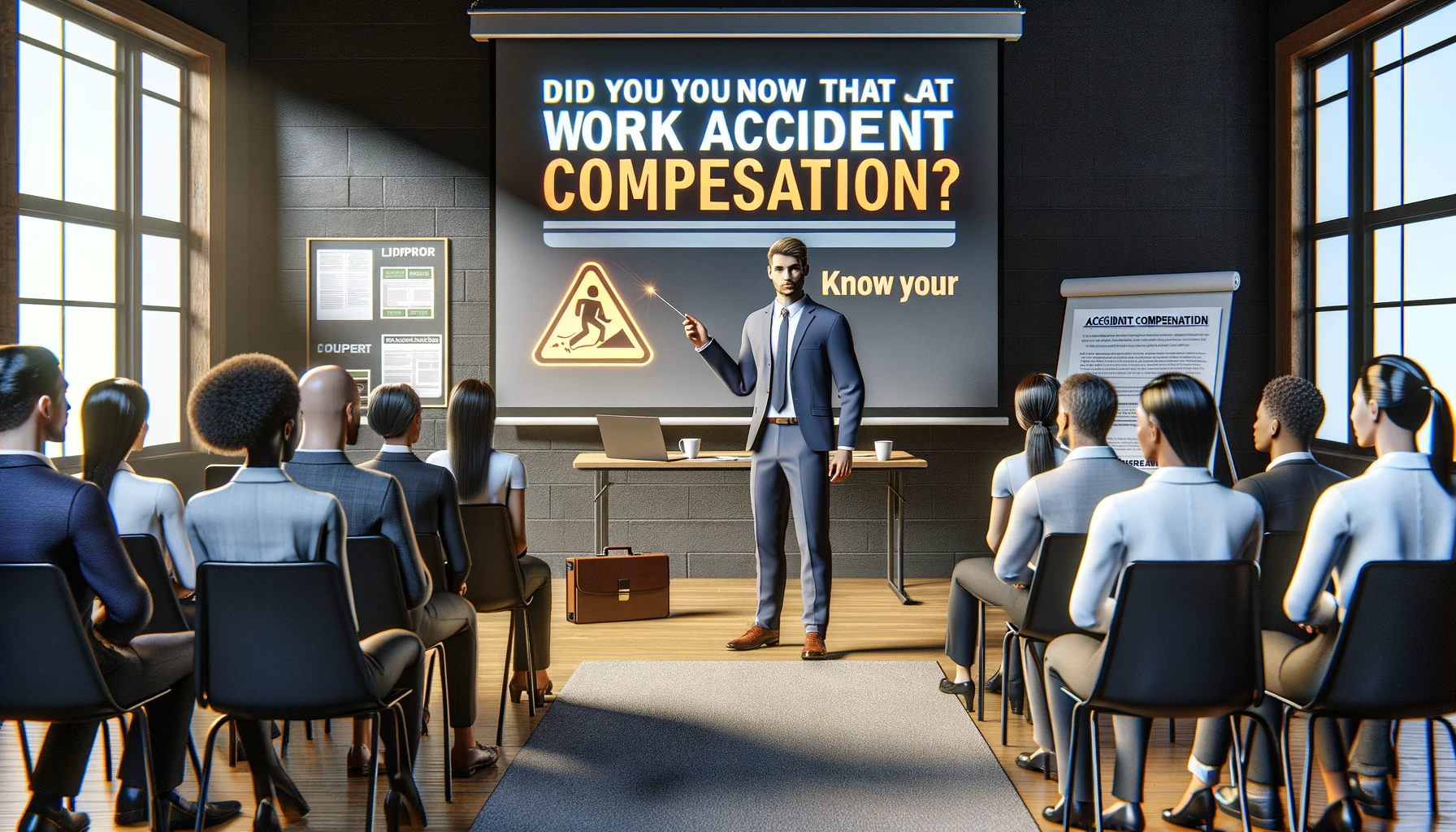Workplace accidents are an unfortunate reality that can lead to tragic outcomes, including death and serious injuries. For those affected, understanding the compensation benefits available is crucial to navigating the aftermath of such incidents. This article aims to shed light on the various types of compensation benefits that may be accessible to workers or their families in the event of a workplace accident.


Understanding Workers' Compensation Claims
Workers' compensation is a form of insurance providing wage replacement and medical benefits to employees injured in the course of employment. It is designed to protect workers and their dependents against the economic toll of work-related injuries and to provide essential support during recovery. To be eligible, the accident must have occurred while the employee was performing job-related duties.
Types of Compensation Benefits
When it comes to workplace accidents, there are several types of compensation benefits that one may be entitled to receive. Fatal work injury compensation is provided when an employee loses their life due to a job-related incident. This includes workplace death benefits that may cover funeral costs and provide financial support to the deceased worker's family. Serious injury insurance claims address the needs of those who have suffered significant injuries, ensuring they receive adequate medical care and compensation for lost wages. For injuries resulting in long-term consequences, permanent disability benefits may be awarded to support the individual's altered lifestyle and needs.Workplace Death Benefits
The loss of a loved one due to a workplace accident is devastating. To ease the financial burden on families, survivor benefits for workplace death are often provided, which may include a lump sum payment or ongoing financial support. Death in service benefits are typically included as part of an employee's compensation package, offering additional financial protection. Workman's comp death benefits are specifically designed to provide for the dependents of the deceased worker, helping them cope with the loss of income.Compensation for Serious Injuries
In the case of non-fatal accidents, a work-related injury settlement can help cover the costs associated with recovery, such as medical expenses and rehabilitation. Industrial accident compensation is tailored to support those who have suffered injuries in industrial settings, where risks may be higher. These benefits are crucial in ensuring that injured workers can focus on their recovery without the added stress of financial hardship.Employee Compensation Rights
Every employee should be aware of their employee compensation rights. These rights guarantee that workers can file claims without fear of retaliation and receive fair compensation for their injuries or loss. Knowing how to claim these benefits is essential, and employees should familiarize themselves with the process and any deadlines involved.
Occupational Fatality Payouts
Occupational fatality payouts are determined by various factors, including the worker's salary and the circumstances of the accident. In some cases, dependent benefits after work death are provided, offering additional support to children or other dependents left behind. These payouts are intended to provide a measure of financial stability during a challenging time, recognizing the profound impact of the loss on the deceased worker's family.Financial Aspects of Compensation
The financial impact of a workplace accident can be significant. Loss of earnings benefits help compensate for the income the injured worker is unable to earn while recovering. Accidental death at work coverage ensures that families facing the sudden loss of a breadwinner are not left in a precarious financial situation. These financial aspects of compensation benefits aim to alleviate the economic burden that often accompanies workplace accidents.Legal Recourse for Families
In instances where negligence or unsafe working conditions contributed to the accident, families may pursue a wrongful death workplace lawsuit. This legal action can result in job site accident compensation that goes beyond the scope of workers' compensation, potentially including punitive damages. Wrongful death lawsuits are a way for families to seek justice and hold responsible parties accountable for their actions or negligence.Navigating the Claims Process
Filing a workplace accident injury claim can be a complex process. It is important to report the injury promptly, seek medical attention, and document everything related to the incident. This documentation will serve as critical evidence when pursuing compensation benefits. In many cases, seeking legal assistance can help ensure that the claim is handled correctly and that the injured party receives all the benefits they are entitled to. Legal professionals experienced in workers' compensation cases can guide individuals and families through the intricacies of the claims process.Conclusion
Navigating the world of compensation benefits for death or serious injuries in workplace accidents can be overwhelming. However, understanding the types of benefits available and the processes involved is essential for affected workers and their families. While no amount of compensation can undo the damage caused by such accidents, these benefits play a critical role in providing financial stability and support during difficult times. Workers' compensation is a vital safety net designed to protect employees and their loved ones. It serves as a reminder of the importance of workplace safety and the need for robust protective measures to prevent such tragedies from occurring in the first place. As workplaces continue to evolve, both employers and employees must prioritize safety and ensure that all necessary precautions are taken to minimize the risk of accidents.Look for an attorney who has the right legal resources for your legal needs.
Contact us here on the Warmuth Law website or through our hotline 888-517-9888.
Frequently Asked Questions (FAQ's):
What is workers' compensation, and who is eligible for it?
Workers' compensation is an insurance program that provides benefits to employees who suffer job-related injuries or illnesses. Eligibility typically requires that the injury or illness occurred while the employee was performing work-related tasks. It is a no-fault system, meaning that benefits are provided regardless of who was at fault for the accident.Can family members receive benefits if an employee dies due to a workplace accident?
Yes, family members can receive survivor benefits for workplace death, which may include financial support and coverage of funeral expenses. These benefits are designed to alleviate the financial burden on the deceased employee's dependents. The specific benefits and eligibility criteria may vary by jurisdiction, so it's essential to consult the relevant workers' compensation authority or legal professionals for guidance.Are there specific benefits for serious but non-fatal injuries at work?
Employees who suffer serious but non-fatal injuries may be entitled to a serious injury insurance claim, which can cover medical expenses, rehabilitation costs, and compensation for lost wages during recovery. The availability and scope of such benefits can vary by jurisdiction and the severity of the injury. Workers' compensation laws and regulations differ from state to state or country to country, so it's important to consult the appropriate authorities or legal experts for information specific to your situation.What should I do if I'm injured at work?
If you're injured at work, it's essential to take the following steps:- Report the injury to your employer as soon as possible, preferably in writing. Failure to report the injury promptly could affect your ability to claim benefits.
- Seek medical attention immediately, even if your injuries seem minor. Your health and well-being should be your top priority.
- Document all aspects of the incident, including the date, time, location, and circumstances of the accident. Keep a record of any conversations or interactions related to the injury.
- Follow your doctor's recommendations for treatment and recovery. Keep copies of all medical records, bills, and receipts.
- Consult with your employer's workers' compensation insurance carrier to initiate the claims process.
- If you encounter any challenges during the claims process or have concerns about your benefits, consider seeking legal advice or assistance from a workers' compensation attorney. They can help protect your rights and ensure you receive the benefits you deserve.











